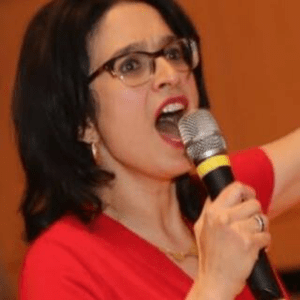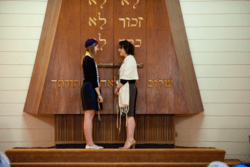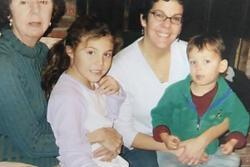Sometimes Your Mom’s Friends are Your Friends Too
“There was nothing not Jewish in my environment, except for my housekeeper,” Stephanie Ives, the head of the Beit Rabban Day School in Manhattan, explained to me at her cozy home in Riverdale, NY. Stephanie grew up going to a single-sex Orthodox day school and later went to Stern College for Women, a partner with Yeshiva College. But knowing her today, you’d never be able to tell. Since then Stephanie has exploded into a Jewish feminist badass, and yet a lot remains the same. Her Jewish identity, for example, is still all encompassing, just in a different way.
Initially, I wanted to interview Stephanie because she’s inspired me in terms of my feminist identity and activism. We got to know each other over countless Shabbat lunches and she was an important role model and mentor for me during my middle-school years when I stirred the pot at my Orthodox day school by wearing a talit during morning prayer. After speaking with her though, I realized that her presence in my life had mainly shaped my Jewish identity. So much of her story was influenced by her religious upbringing. Having been raised in an observant home and school, most of her experiences (feminist and otherwise) were shaped by Judaism, and this is something we have in common.
Growing up Orthodox and being a feminist is inevitably a life full of contradictions. For Stephanie this was certainly true. In religious settings she was surrounded by many scholarly women and was taught to love her faith and her heritage, and yet only men lead services. She was encouraged to study Jewish texts and lead a Jewish life, but because of her gender, she was never able to be a leader within the Orthodox world. At home, her mother was undeniably feminist from an ideological standpoint, and pushed Stephanie to be whoever she wished to be. Though this type of encouragement was crucial, because of their religious affiliation, Stephanie didn’t see her mother embody these feminist ideals in practice.
Though feminism and Judaism certainly didn’t blend harmoniously in the early stages of Stephanie’s life, her upbringing cultivated a strong connection with Judaism. Commonly in the Orthodox world when fundamental values are in tension, one either rejects Judaism or strict religious practice completely, or delves deeper into one’s religious self, what is colloquially known as “frumming out.” In other words, it’s usually an “either or” type of situation. This was not the case with Stephanie. She knew there was much value in traditional Judaism. She soaked in delicious Shabbat afternoons and relished studying some Jewish texts, but the limited female role left much to be desired.
When we talked, Stephanie described a pivotal moment that helped her decide how to proceed with her life Jewishly. While attending a yeshiva in Israel, she once overheard a boy quoting a tractate of Mishna during a flirtatious phone conversation. The quote advised against talking to women for too long, lest it lead to witchery or other such inappropriate behaviors. She referred to this anecdote, saying, “Talk about Pirkei Avot coming back to bite you in the ass.” She confided that this was the first time she’d experienced boys feeling like they had higher status merely because of gender. There was a sense of entitlement that caused Stephanie discomfort. This feeling that she was seen as less than prompted her to create a Jewish experience that didn’t differ based on sex, but was equally rich in learning, spirituality, and tradition. She made space for feminism while maintaining a somewhat traditional Jewish practice, something that I aspire to do as well.
Today, Stephanie leads a spiritual, Jewish life that is also undoubtedly feminist. In her position at Beit Rabban, she attempts to help a new generation of Jews live out and grapple with the tensions within Judaism and Jewish life in a relaxed and exploratory setting. She managed to pave a path for herself that was religiously nourishing, as well as fulfilling in terms of culture, feminism, and other elements that aren’t inherently Jewish. Because of Stephanie, I have begun to cultivate a Jewish life that doesn’t shut out other influences, but rather uses them to enrich my Jewish identity.
This piece was written as part of JWA’s Rising Voices Fellowship.







